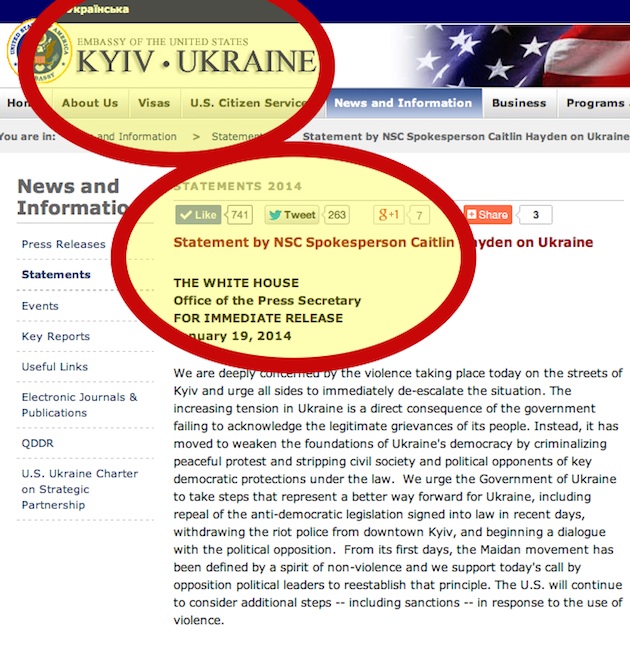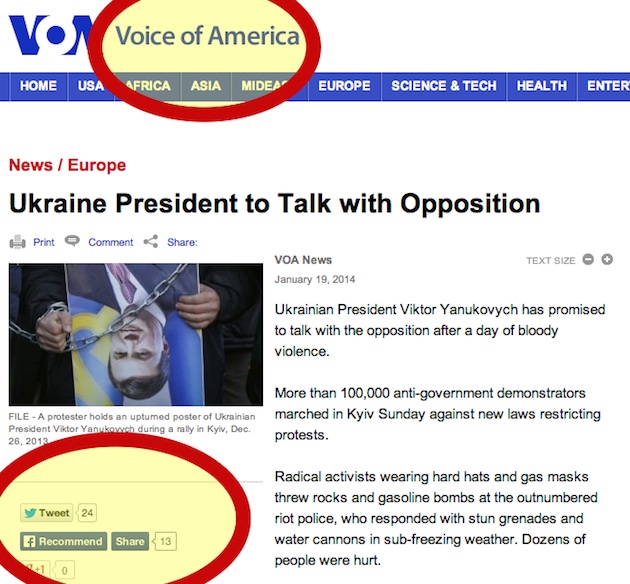BBG Watch Commentary
When it comes to posting news online and social media popularity, even a U.S. embassy abroad can beat the badly managed Voice of America (VOA) these days, even on breaking news with important U.S. foreign policy implications.
U.S. Embassy in Kyiv was first in posting online Sunday’s White House statement on Ukraine by National Security Council (NSC) spokesperson Caitlin Hayden. The statement urged all sides to immediately de-escalate the situation which has become very violent.
It was not news reporting by the embassy per se since U.S. diplomatic posts are not in the news business. They are engaged in traditional diplomacy vis-a-vis foreign governments, but in this case also in public diplomacy vis-a-vis foreign publics and foreign media. This was an exercise by U.S. diplomats in public diplomacy — an attempt to get the word out quickly to the Ukrainians and to Ukrainian and international media. It worked in terms of both speed and social media outreach.
U.S. Embassy in Kyiv had an advantage on speed in its online posting since it was no doubt consulted by the NSC on drafting the statement. It may have even initiated it. The fact remains that the embassy posted it online right away, in both English and Ukrainian. In this sense, it did a far better job than also U.S. taxpayer-funded Voice of America. The embassy also took advantage of social media better than the White House, not to mention VOA.
The White House released the statement to the media Sunday at about 6:30 PM EST, but it was not posted on the White House website until much later. It was Sunday of a holiday weekend, and the White House is not in the news business either, although perhaps in the interest of media coverage and U.S. public diplomacy abroad it should have posted its statement on its website, Facebook and Twitter right away. It did not. In any case, U.S. Embassy in Kyiv did it, and that’s how most media got wind of the story.
References to the White House statement started to appear in Ukraine and in some European media within about half and hour or so after the Embassy in Kyiv had posted it on its website.
It took Voice of America in Washington, however, about two and a half hours to publish anything on the White House statement on the VOA English news website — not as a separate news report, as some might have expected, especially in Ukraine, but as a last paragraph in a very short VOA news item, 170 words, 26 of which were about the Obama administration’s views on the situation in Kyiv: “A White House spokeswoman is calling for calm. She calls the tension a direct consequence of the Ukrainian government’s failure to acknowledge the people’s legitimate grievances,” VOA reported. The White House statement itself had 166 words.
Sources within the VOA newsroom admitted to BBG Watch that some newsroom people saw the White House statement at about 6:30 PM, but due to poor management this short news item was not posted on the VOA English website until about 9:00 PM. By that time, other international media were already reporting on it for at least two hours.
Some international media outlets were also reporting on a much earlier statement issued and posted online by the U.S. Embassy in Kyiv on its own behalf.
U.S. Embassy Urging Calm and Political Dialogue: http://t.co/yARkoOOxMj
— Geoffrey Pyatt (@GeoffPyatt) January 19, 2014
That statement, reported by BBC, Voice of Russia (VOR), Deutsche Welle (DW), and others called for an end to ongoing violent confrontations between protestors and police in Kyiv and urged calm and political dialogue. VOA English news website took no notice of this much earlier U.S. Embassy statement although it also represented U.S. policy. Other international media did. In fact, on Ukraine, foreign audiences could have learned much more this week about U.S. positions on Ukraine from BBC, DW, RT (Russia Today), Voice of Russia, Radio France Internationale (RFI) and many other foreign media outlets than from Voice of America.
Radio Free Europe / Radio Liberty (RFE/RL), like VOA also funded by U.S. taxpayers, is doing an excellent job reporting news, even U.S. news, but its target area is limited and its primary job is to focus on local news rather than U.S. foreign policy.
By the time VOA English website reported briefly on the White House statement for the first time at about 9:00 PM EST Sunday, the U.S. Embassy in Kyiv posting on it in English already had over 200 Facebook “Likes,” an indication that it was widely read. It was also widely read and “Liked” in Ukrainian.
Several hours after the VOA report appeared with a brief mention of the White House statement, it managed to attract only 6 Facebook “Likes.” About 18 hours later, by 3:00 PM EST, Monday, the VOA report in English still shows only 13 Facebook “Likes,” 24 Tweets, zero Google+ and zero comments.
The U.S. Embassy in Kyiv post on the statement is showing 755 Facebook “Likes,” 263 Tweets, 7 Google+ on the embassy website, and 77 comments on the Embassy Facebook page as of 3:00 PM EST, Monday.
Voice of America is very poorly managed and a mere shadow of what it used to be as a news organization a few years ago. In previous years, VOA would have been one of the first ones to report at length on such U.S. foreign policy statements, but this type of news reporting has been de-emphasized by current VOA executives in favor of fluff journalism, which by the way also fails to attract attention through social media. These executives have encouraged posting of dozens of reports on the British royal wedding and royal baby christening, while VOA reporting from the White House, the State Department, and the U.S. Congress has been minimized.
But when challenged on news handling by members of their oversight board — the Broadcasting Board of Governors (BBG) — VOA Director David Ensor responded that it is “a resource issue.”
Audiences abroad no longer have a good reason to go to the VOA English website to get hard news about the United States. Many VOA journalists are appalled by this programming policy, but VOA Director David Ensor stated recently that “Voice of America is not a propaganda organization and it is not a mouthpiece of the White House or of anybody else.” “It is a proud journalistic organization more than seventy years old,” Ensor added. By the way, this statement by David Ensor, posted online over a month ago, has gotten so far only 3 Facebook “Likes.”
Many VOA journalists believe that David Ensor’s statement is just an excuse for bad management and not reporting significant news about U.S. foreign policy. Some also see it as an excuse for ignoring the VOA Charter, which is public law in the United States, and which says that “VOA will present the policies of the United States clearly and effectively, and will also present responsible discussions and opinion on these policies.”
For example, BBC, Deutsche Welle, RT (Russia Today), Voice of Russia, Wall Street Journal, Washington Post and almost every major international and U.S. media outlet reported at length on President Obama’s rare interview with German TV on Saturday, in which he amplified some of the themes of his Friday NSA speech and promised that the U.S. will not spy on German Chancellor Angela Merkel and leaders of other friendly countries. The Voice of America did not report on this interview. The VOA English website also had no reports on an earlier on camera statement on Ukraine by Secretary of State John Kerry and similar statements from key members of the U.S. Senate who held a special hearing on Ukraine on Thursday. (The VOA Ukrainian Service reported on these statements, but it is not getting enough resources from the management to do its job properly.)
U.S. Embassy in Kyiv YouTube video on Secretary Kerry’s remarks on Ukraine with Ukrainian subtitles has had so far over 3,000 views, far better than many videos posted on the VOA English YouTube account.
Ukraine aside, VOA English website news on Syria, Iran, Egypt, Turkey, China, or Russia — many of them not even originated by VOA but re-posts of Reuters news reports — rarely get more than a few dozen Facebook “Likes” — frequently between zero and 10 — while Al Jazeera, BBC, and RT get hundreds and thousands.
With VOA English news abandoning serious reporting on U.S. foreign policy to Al Jazeera, Iran’s, China’s and Russia’s external broadcasters — all with predictable results in terms of spin and propaganda — the U.S. State Department and U.S. embassies abroad have to do whatever they can to keep foreign publics and foreign media informed.
The State Department and U.S. embassies are not, however, in the news business and cannot attract vast audiences through social media alone. Their hope is that professional media outlets will at least quote from these U.S. statements posted online. This works to some degree in some countries, but not everywhere.
The Voice of America is in the news business and could attract a large online audience, also through social media. But at this time, some U.S. embassies are doing a far better job than VOA in providing information about U.S. policies to foreign publics, directly and indirectly.
U.S. Embassy in Kyiv has done an exceptionally good job in this respect. It has just re-posted U.S. Ambassador to Ukraine Geoffrey R. Pyatt’s op-ed, “Ukraine in 2014.”
Ambassador Pyatt is also active on his Twitter account. He got more re-Tweets on his White House statement post than most VOA English news get on Twitter.
Statement by National Security Council Spokesperson Caitlin Hayden on Ukraine: http://t.co/jlUQQZkxFw
— Geoffrey Pyatt (@GeoffPyatt) January 20, 2014
Protesters, Police Clash in Ukraine Capital http://t.co/DewWwAsavV
— Voice of America (@VOA_News) January 19, 2014
As of 6:00 PM EST, Monday, Ambassador Pyatt’s yesterday’s Tweet shows 98 re-Tweets and 24 “Favorites.” VOA English Tweet yesterday shows only 5 re-Tweets and 1 “Favorite.”
The U.S. Embassy in Moscow and U.S. Ambassador Michael McFaul are also doing all they can to get the word out about U.S. policies and American views through social media. Ambassador McFaul re-Tweeted the White House statement on Ukraine from the U.S. Embassy in Kyiv website.
Statements 2014 | Embassy of the United States Kyiv, Ukraine http://t.co/fKiox9pYoz
— Michael McFaul (@McFaul) January 20, 2014
At the very least, embassy online posts are picked up by many Ukrainian and foreign journalists and the U.S. Embassy in Kyiv gets far greater audience engagement through social media on Ukraine-related posts than the dysfunctional VOA English website.
VOA English website’s recent, rare and short, posts on Ukraine — many of them from Reuters rather than from VOA, and not updated with new information sometimes for days — usually show from zero to ten Facebook “Likes.”
Only the VOA Ukrainian Service, and to some degree the VOA Russian Service, try to keep high standards of journalism in reporting on Ukraine and U.S. reactions to events there, but their overworked staff is also falling behind.
VOA’s Ukrainian Service cannot report to the whole world. It is focused on its highly popular Ukrainian television program and does not have enough people and resources to do more online reporting. VOA English newsroom has been decimated and most of the time is completely unable to respond to breaking news developments. It lacks resources, but above all it lacks leadership and good management.
Members of the Broadcasting Board of Governors, who have oversight responsibilities, should take action when Voice of America fails to report or is late in reporting on significant U.S. foreign policy news. They should be deeply concerned when a U.S. Embassy abroad can get many times more Facebook “Likes” for posting a White House statement online (and post it much faster) than VOA can get for its English language news reports.

